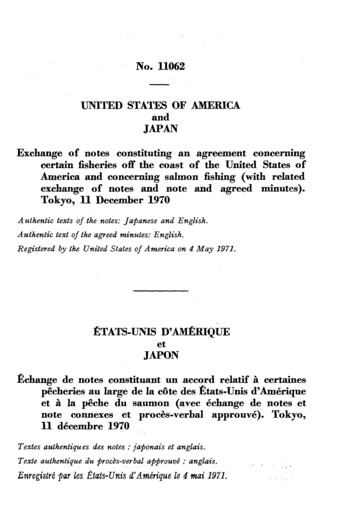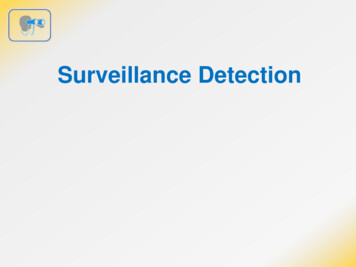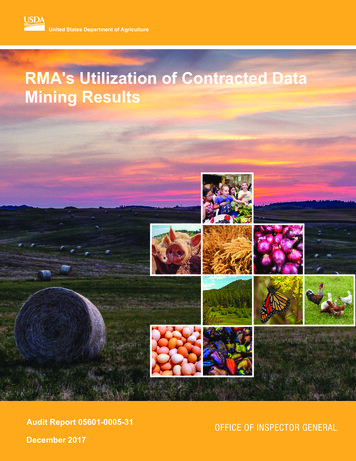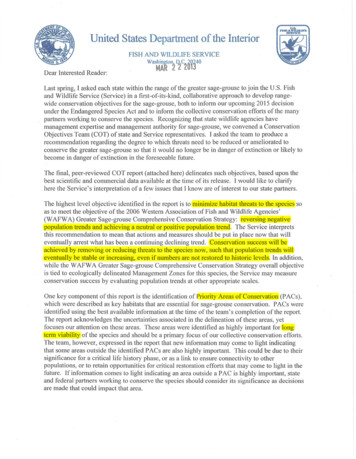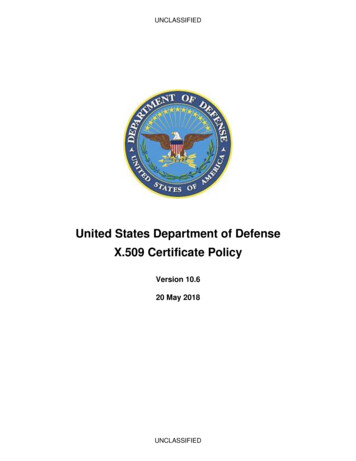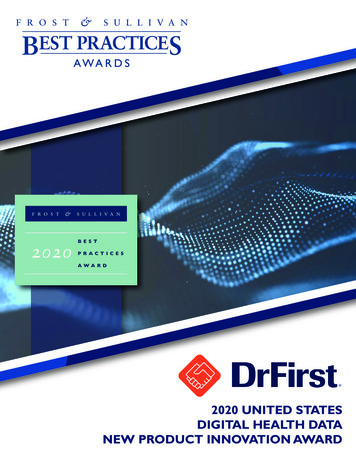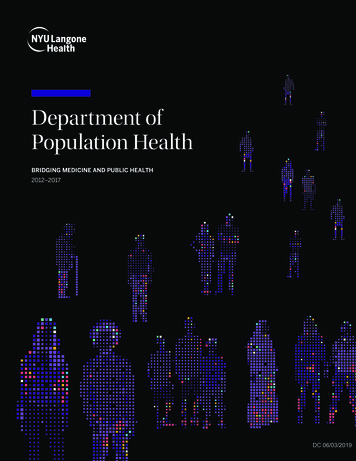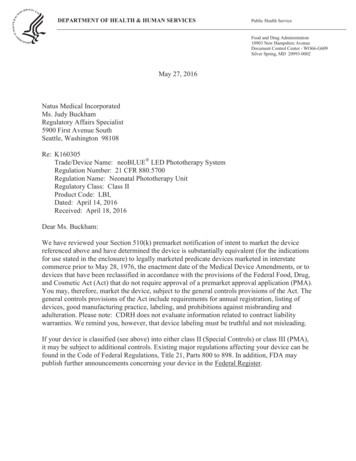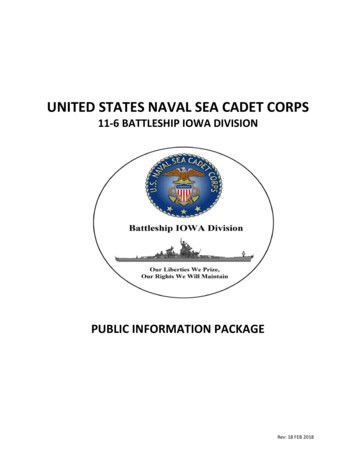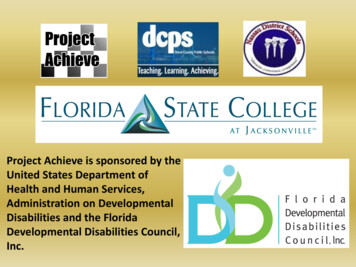
Transcription
Project Achieve is sponsored by theUnited States Department ofHealth and Human Services,Administration on DevelopmentalDisabilities and the FloridaDevelopmental Disabilities Council,Inc.
Starting-Up a Career Tech ProgramHartwick SymposiumPre-Conference SessionsOctober 2, 2013Boca Raton, FloridaPresenter: Daniel WestProject Achieve CoordinatorFlorida State College at Jacksonville101 West State StreetRoom A 1001AJacksonville, Florida 32202Phone: 904-633-8456Email: Daniel.West@fscj.edu
IntroductionThe Project Achieve Grant 3 year FDDC grant to develop a model program for replicationat Florida State College and Technical Centers Achieve is a model program that experimented and expandedat an accelerated rate to explore new options to supportstudents and create programs Developed multiple program models for replication Collaborators and supports are everywhere! That is why weare here today.
PSAV ProgramPSAV: Post-Secondary Adult Vocational ProgramNon-College Credit Certificate Programs at FSCJMany programs are accessible WITHOUT a standard highschool diploma.Check your local college or tech center website forprogram options in your area.
PSAV ProgramCosmetologyAutomotive Collision Repair andFacial SpecialtyRefinishingChild CareBuilding Trades and Construction DesignDiesel Engine RepairTechnologyArticulated NursingAutomotive Service TechnologyMassage TherapyCommercial Vehicle DrivingElectricalLogistics and DistributionWeldingOffice AdministrationBrownfieldAircraft Coating TechnicianCommercial Foods and Culinary Arts
VERTICAL ClassesVocational LearningCWD: Continuing WorkforceDevelopmentComprehensive Soft Skills andEmployment Skills CurriculumA part of the Continuing Educationdepartment that includes contracttraining, professionaldevelopment, and personalenrichment. NOT accredited orattached to an academicdepartment.
VRDivision of Vocational RehabilitationImportant feature: Individual Plan for Employment (IPE)The IPE defines an employment goal for the consumer.All the services provided by VR must align with theiremployment goal, including the content of theVERTICAL classes. Students in VERTICAL haveemployment goals matching their programs of study.
VERTICAL Model Students who have graduated with a special diploma Target population is ages 18-25 Target is students with intellectual and/or developmentaldisabilities Funding for VERTICAL classes provided by VR Funding for PSAV classes provided by VR Receiving support from adjunct instructors who teachVERTICAL Classes
TIES Model Ages 18-22, still under FAPE Utilizing Dual Enrollment to access PSAV Classes Receiving support from DCPS or NCSB transition staff Have completed requirements to graduate with a special diploma,but choose to delay acceptance to allow access to dual enrollmentoption Supports provided by a DCPS teacher in the TIES classroom A lower level of support Small number of students Carly Detlefsen – Duval County Public Schools Drew Andrews
VERTICAL/TIES Model 18-22 Funding for VERTICAL classes provided by VR Utilizing Dual Enrollment to access PSAV Classes Receiving support from adjunct instructors who teachVERTICAL Classes Receiving support from DCPS or NCSB Transition staff Have completed requirements to graduate with a specialdiploma, but choose to delay acceptance to allow accessto dual enrollment option Majority of students
The “Start-up” ModelSTUDENTS Explore the program options of your local state college or techcenter Locate 5 students with developmental disabilities who wantvocational training Target “high success” students for Cohort 1! Good behavior Good attendance Good communication skills Motivated to succeed Family support
The “Start-up” ModelVOCATIONAL REHABILITATION Find your champion! Start with one person, a VR counselor orsupervisor, and explain the program to garner support. If you need help locating support:Kirk HallVR Transition AdministratorKirk.Hall@vr.fldoe.org Begin the IPE process EARLY! Make sure this is 100% donemonths before classes start!
The “Start-up” ModelSTATE COLLEGE Create a CWD course based on the VERTICAL curriculumThursday 8:15-9:15 ARUBAProviding Student Vocational Supports Using Continuing EducationDaniel West&Thursday 10:45-11:45 ARUBASetting Up Student Orientations for your ProgramMelissa AdamsAnnie Johnson Provide a contact in the enrollment office and office of servicesfor students with disabilities to assist in enrolling students,providing schedules and billing information to VR, andaccommodations
The “Start-up” ModelSTATE COLLEGE Provide a contact in the enrollment office and office of services forstudents with disabilities to assist in enrolling students, providingschedules and billing information to VR, and accommodations It is vital to have good communication regarding these studentsenrollments, schedules, and payments to ensure a smooth start-up.Thursday 8:15-9:15 ARUBAProviding Student Vocational Supports Using Continuing EducationDaniel West
The “Start-up” ModelSTATE COLLEGE Recruit 2 part-time adjunct instructors Classroom instructor Assessment instructor These part-time adjuncts will teach the VERTICAL curriculumand ensure that students are taught to access appropriatesupportsThursday 9:30-10:30 ARUBASupporting Career/Tech StudentsEthel Still-Richardson
Funding Source for VERTICALVR and the Individual Plan for EmploymentVR can pay for training for students that progresses toward theemployment goal stated on the student’s IPE. This can includeCWD/CE classes like the VERTICAL classes.All decisions and procedures follow standard VR policies and aremade based on the students individual needs and the servicesstated on the IPE.ARUBA – Thursday 3:00-4:00 - Kirk HallCollaboration with VR for the Provision of PostsecondaryEducation: Clarifying Procedural Expectations and Requirements
Funding Source for TIESDual EnrollmentStudents must be currently enrolled high school students.Generates funding for the school district that can be used tostaff the program.School district pays for books.Carly Detlefsen, M.EdDCPS EE/SS Transition Specialist904-390-2940detlefsenc@duvalschools.org
Other Funding SourcesMcKay ScholarshipsUniversity of North Florida On Campus Transition ProgramCrystal Makowski, Kris Webb, Aylssa SharpTHURSDAY SESSIONS8:30-9:15 BERMUDAThe Americorp Mentor Program at UNFChelsea Rhodes3:00-4:00 CANCUNBest Practices at UNF: Experiential Learning & the AuthenticCollege ExperienceCrystal Makowski4:15-5:15 BARBADOSThe UNF Residential ProgramAylssa Sharp
Other Funding SourcesComprehensive Transition and Post-Secondary ProgramThursday1:45-2:45 BERMUDAComprehensive Transition & Postsecondary Programs & Title IVFederal Student Aid EligibilityIan FossPrivate Pay
Building Support Find your champion, wherever they are! A program can be initiated from a variety of agencies orinstitutions. VR Post-Secondary Institution School District You will need support from people across all the agencies,but the “push” can come from anywhere.
Building Support Who you need to know and get support from: VR Supervisor Office of Services for Students with Disabilities at PostSecondary institution PSAV and Continuing Education at Post-Secondaryinstitution School District transition staffLet them see the vision of success!
Building Support What they need to know: Advanced Supports Success in PSAV Programs A definition of “Success” This population is a part of the community These students remain unemployed at a very highrate (72-78%) if they do not receive training andassistance entering the workforce A benefit to the campus community, not just “our”students Look at your Post-Secondary Institutions MissionStatement. Connect these students and programs tothose goals and missions.
Building SupportMission StatementThe mission of Florida State College at Jacksonville is to provideoptimal access to high quality, affordable and relevant degree, careerand community education to enhance the lives of our students andthe economic development of Northeast Florida.
Building SupportCollegewide GoalsThe mission of Florida State College at Jacksonville will be fulfilled, in significant measure,through the continuous, responsive pursuit of academic excellence through the followingcollegewide goals:1. Prepare students for distinctive success in their academic, career and personal goalsthrough collaboration within the College community and individual initiative.2. Inspire students to a lifetime commitment to continued learning, informed civicengagement, ethical leadership, cultural appreciation, social responsibility andmulticultural awareness in an interconnected world.3. Optimize access to College programs and services.4. Provide to students an extraordinarily positive experience in every engagement withthe College.5. Contribute significantly to the ongoing economic development of the Northeast Floridaregion.
Other ResourcesFlorida Developmental DisabilitiesCouncilwww.fddc.orgFlorida Consortium onPostsecondary Education andIntellectual .info
ContactsJane Silveria, State SupervisorFlorida Department of EducationDivision of Career and irk G. HallTransition AdministratorDivision of ldoe.orgApril KatineChild Development/EducationProgram ManagerFlorida Developmental DisabilitiesCouncil, Inc.850-488-4180Aprilk@FDDC.ORGMickie Hayes, M. Ed.Director, Florida Consortium onPostsecondary Education andIntellectual Disabilities727-873-4396mhayes6@mail.usf.edu
Project Achieve is sponsored by theUnited States Department ofHealth and Human Services,Administration on DevelopmentalDisabilities and the FloridaDevelopmental Disabilities Council,Inc.
Continuing Education as a Model for SupportHartwick SymposiumBreakout SessionOctober 3, 2013Boca Raton, FloridaPresenter: Daniel WestProject Achieve CoordinatorFlorida State College at Jacksonville101 West State StreetRoom A 1001AJacksonville, Florida 32202Phone: 904-633-8456Email: Daniel.West@fscj.edu
IntroductionThe Project Achieve Grant 3 year FDDC grant to develop a model program for replicationat Florida State College and Technical Centers Achieve is a model program that experimented and expandedat an accelerated rate to explore new options to supportstudents and create programs Developed multiple program models for replication Collaborators and supports are everywhere! That is why weare here today.
PSAV ProgramPSAV: Post-Secondary Adult Vocational ProgramNon-College Credit Certificate Programs at FSCJMany programs are accessible WITHOUT a standard highschool diploma.Check your local college or tech center website forprogram options in your area.
PSAV ProgramCosmetologyAutomotive Collision Repair andFacial SpecialtyRefinishingChild CareBuilding Trades and Construction DesignDiesel Engine RepairTechnologyArticulated NursingAutomotive Service TechnologyMassage TherapyCommercial Vehicle DrivingElectricalLogistics and DistributionWeldingOffice AdministrationBrownfieldAircraft Coating TechnicianCommercial Foods and Culinary Arts
VERTICAL ClassesVocational LearningCWD: Continuing WorkforceDevelopmentComprehensive Soft Skills andEmployment Skills CurriculumA part of the Continuing Educationdepartment that includes contracttraining, professionaldevelopment, and personalenrichment. NOT accredited orattached to an academicdepartment.
VRDivision of Vocational RehabilitationImportant feature: Individual Plan for Employment (IPE)The IPE defines an employment goal for the consumer.All the services provided by VR must align with theiremployment goal, including the content of theVERTICAL classes. Students in VERTICAL haveemployment goals matching their programs of study.
VERTICAL Model Students who have graduated with a special diploma Target population is ages 18-25 Target is students with intellectual and/or developmentaldisabilities Funding for VERTICAL classes provided by VR Funding for PSAV classes provided by VR Receiving support from adjunct instructors who teachVERTICAL Classes
TIES Model Ages 18-22, still under FAPE Utilizing Dual Enrollment to access PSAV Classes Receiving support from DCPS or NCSB transition staff Have completed requirements to graduate with a special diploma,but choose to delay acceptance to allow access to dual enrollmentoption Supports provided by a DCPS teacher in the TIES classroom A lower level of support Small number of students Carly Detlefsen – Duval County Public Schools Drew Andrews
VERTICAL/TIES Model 18-22 Funding for VERTICAL classes provided by VR Utilizing Dual Enrollment to access PSAV Classes Receiving support from adjunct instructors who teachVERTICAL Classes Receiving support from DCPS or NCSB Transition staff Have completed requirements to graduate with a specialdiploma, but choose to delay acceptance to allow accessto dual enrollment option Majority of students
The VERTICAL Model Four classes taught by adjunct instructors Summer Stand alone seven week orientation class Meets 4 days a week Fall/Spring/Summer Student is simultaneously enrolled in PSAV classes Sample Schedule M-TR 2:00-7:00 PSAV class T/R 8:30-11:00 VERTICAL class Meets twice a week for 5 hours total Tuition is funded by VR on an individual basis
Build a Program, Start with a Plan A champion with a clearly defined plan of action will buildsupport Don’t ask for the moon, start with a corner Low risk, low commitment on the part of any one agency Emphasize meeting the needs of students through existingsystems and programs Put students’ faces to the program’s goals
Build a Program, Start with a PlanSteps for Implementation1.2.3.4.5.6.7.8.Find your championPrepare your proposal, including curriculum, targetedprograms, staffing needs, budget, and plans for supportFind candidate students, refer to VR and assist studentswith processApproach decision makers in your champion’s agency andgain supportApproach decision makers in collaborative agencies andgain supportCreate classesRecruit staffStart classes!
Build a Program, Start with a PlanSteps for Implementation1.2.3.4.5.6.7.8.Find your champion
Building Support Find your champion, wherever they are! A program can be initiated from a variety of agencies orinstitutions. VR Post-Secondary Institution School District You will need support from people across all the agencies,but the “push” can come from anywhere.
Build a Program, Start with a PlanSteps for Implementation1.2.3.4.5.6.7.8.Prepare your proposal, including curriculum, targetedprograms, staffing needs, budget, and plans for support
The VERTICAL CurriculumOrigins The VERTICAL Curriculum borrowed heavily from the STINGRAYcurriculum model used at USF-St. Petersburg The curriculum was designed to meet the requirements of anexisting state framework for a PSAV program Career Education For Students With Disabilities In the future, the program MAY transition to PSAV Advantages More “established” Recognized certificate Disadvantages Less flexible Accreditation requirements for implementation
The VERTICAL CurriculumSTINGRAY1.2.3.4.5.6.7.8.9.10.Self DeterminationFunctional Academics & TechnologyFinancial Planning & Money ManagementSocialization, Relationships, Self-EsteemEmploymentTravel & MobilityCommunity LivingHome LivingPersonal CareHealth & D 68
The VERTICAL CurriculumCareer Education For Students With e/addl cte frames13.asp
The VERTICAL CurriculumProcess Dr. Besty Stoutmorrill, FSCJ Reading Instructor Workshop with Kirk Hall, Tinisha Ladson (VR Supervisor),Mickie Hayes, and other collaborators Set parameters to combine the STINGRAY and CareerEducation For Students With Disabilities curriculums into anEmployment Readiness curriculum that aligns with VR’smission of employment See handout for result
The VERTICAL Curriculum Domain 1: Self-Determination in Career Choice, Goal-Setting,Planning for Work Domain 2: Functional Academics and Technology for CareerTraining, Seeking Employment, Workplace Success Domain 3: Workplace Culture, Associations, and Self-Esteem Domain 4: Employability Domain 5: Travel for Training, Career Advancement, and JobSecurity Domain 6: Health, Safety, and Risk Management in theWorkplace
The VERTICAL CurriculumIndividualized Progress Plan (IPP): Skills improvementimplemented if the current level would inhibit employmentDomain 7: Financial Planning and Money Management Evaluates and augments skills related to money, banking,budgeting, payroll, expenditures, taxes, and creditDomain 8: Community Living Assesses and increases use of community resources for avariety of needs (education, enrichment, and problemsolving) in different environments and settingsDomain 9: Home Living Assesses and trains for independence in living situationDomain 10: Personal Care Evaluates independence levels related to cleanliness, goodhealth, and personal needs
Targeted Programs Any PSAV program that does not require a standard highschool diploma for entry. If the program says it requires a standard diploma, ask why!Find out if it is a requirement or a suggestion. Determine the approximate schedules of these programs soyou can schedule your VERTICAL class appropriately
TABE EntryTABE Scores:These are not state mandated requirements, the post-secondaryinstitution can be flexible, in fact, by law they cannot deny entrybased on TABE scores without demonstrated need.
TABE EntryTABE Scores:TECHNICAL ASSISTANCE PAPER -Career Education Basic Skills AssessmentFlorida Department of EducationPLEASE NOTE: Federal Office of Civil Rights (OCR) legislation prohibits denyingentry into any career education program on the basis of criteria that have theeffect of disproportionately excluding persons of a particular race, color, nationalorigin, sex or handicap. In order to use such criteria, the recipient mustdemonstrate that such criteria have been validated as essential to participationin a given program. (45 C.F.R. 80, Appendix B, Guidelines for EliminatingDiscrimination and Denial of Services on the Basis of Race, Color, NationalOrigin, Sex and Handicap in Vocational Education Programs, Revised 10-1-09)
TABE EntryTABE Scores:TECHNICAL ASSISTANCE PAPER -Career Education Basic Skills AssessmentFlorida Department of EducationThis rule includes permissive language that allows LEAs to exempt adults withdisabilities from meeting the required basic skills level to earn a CareerCertificate of Completion. Since application of the exemption is permissible andnot mandatory, each LEA must develop a local written policy describing the stepsto be followed and documentation to be maintained throughout the testing,remediation, certification, reporting, and audit process. Rule 6A-10.040 (4),F.A.C.This policy should not deny anyone access or opportunities because of adisability.
TABE Waiver6A-10.040 Basic Skills Requirements for Postsecondary Career ay/ruleno.asp?id 6A-10.040No student shall be awarded a career certificate until the student achieves theminimum level of basic skills required for that program by the Department ofEducation. Adult students with disabilities, as defined in Section 1004.02(7),Florida Statutes, may be exempted from meeting the career basic skills gradelevels required for completion of the career program as described in subsection(2) of this rule. Each school district and community college must adopt a policyaddressing procedures for exempting eligible students with disabilities fromthe basic skills exit
The Project Achieve Grant 3 year FDDC grant to develop a model program for replication at Florida State College and Technical Centers Achieve is a model program that experimented and expanded at an accelerated rate to ex
